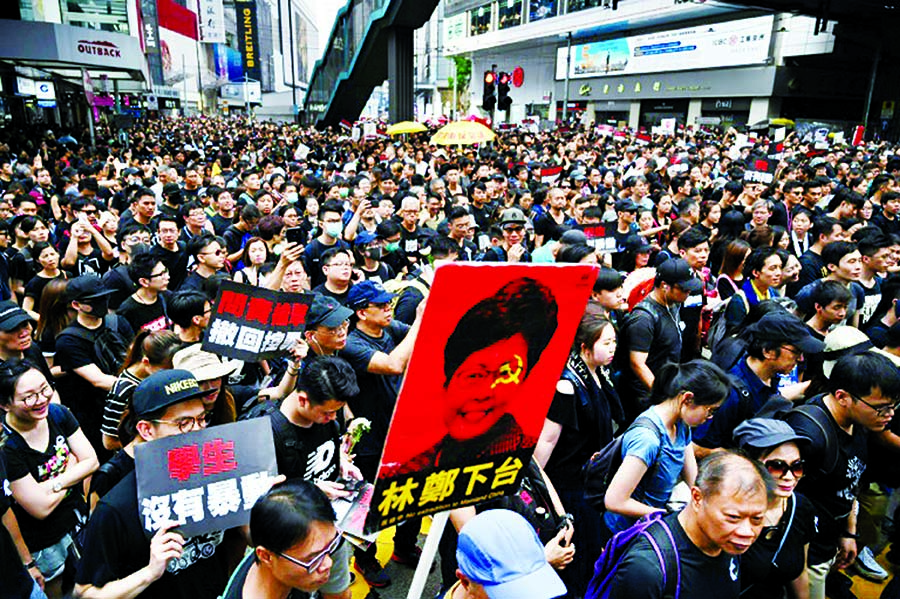
AFP :
Hundreds of thousands of people rallied in central Hong Kong Sunday against a reviled extradition law, the latest huge demonstration to pile pressure on the city’s embattled leader, despite her weekend climbdown.
The enormous show of force saw protesters chanting “Scrap the evil law!” as they marched through the streets calling for the resignation of chief executive Carrie Lam, who paused work on the hugely divisive bill Saturday after days of mounting pressure, saying she had misjudged the public mood.
Throngs of black-clad protesters snaked their way through the city’s streets in dense crowds heading to the city’s parliament-a repeat of a record-breaking demonstration a week earlier that organisers said more than a million people attended.
Critics fear the Beijing-backed law will entangle people in China’s notoriously opaque and politicised courts and damage the city’s reputation as a safe business hub. Although Lam, a pro-Beijing appointee, offered a rare concession on Saturday, she stopped short of committing to permanently scrapping the unpopular law.
Her gesture was swiftly rejected by protest leaders who called on her to resign, shelve the bill entirely and apologise for police using tear gas and rubber bullets earlier in the week.
“Personally I think she can no longer govern Hong Kong, she has lost the public,” Dave Wong, a 38-year-old protester who works in finance, told AFP.
“She has pretended not to hear or see our troubles or the injured protesters, and even called them rioters-this makes us Hong Kong residents furious,” added demonstrator Calvin Wong.
The international finance hub was rocked Wednesday by the worst political violence since before its 1997 handover to China as tens of thousands of protesters were dispersed by baton-wielding riot police.
Many placards in the crowd Sunday accused police of using excessive force.
“You’re supposed to protect us not shoot at us,” read one banner.
“The police should not use rubber bullets, tear gas, and bean bag rounds to deal with the students,” protester Ben Choi told AFP.
Nearly 80 people were injured in this week’s unrest, including 22 police officers, with both sides showing a willingness to escalate their behaviour to levels unseen before in the usually stable business hub.
One man died late Saturday when he fell from a building where he had been holding an hours-long anti-extradition protest.
He had unfurled a banner saying: “Entirely withdraw China extradition bill. We were not rioting. Released students and the injured”.
Huge queues formed outside the high-end Pacific Place mall with flowers and written tributes piling up as demonstrators paid their respects.
The extradition furore is just the latest chapter in what many see as a battle for the soul of Hong Kong.
For the last decade the city has been convulsed by political turbulence between the pro-Beijing authorities and opponents who fear an increasingly assertive China is stamping on the city’s unique freedoms and culture.
But opposition to the extradition bill has united an unusually wide cross-section of Hong Kong from influential legal and business bodies, to religious leaders.
Lam’s decision to ignore those warnings, and press ahead with the bill even after last weekend’s massive rally, has placed her administration under pressure from both her opponents and her own allies.
Advisers and pro-establishment lawmakers urged her to delay the bill after Wednesday’s violence while Beijing began to distance itself from her administration.
Her climbdown was also a rare example of the city’s unelected leaders caving to demonstrations, something more recent administrations have been increasingly unwilling to do.
Two months of protests in 2014 calling for the right to directly Hong Kong’s leader won no concessions from Beijing and key figures from that movement are now in jail.
But anger over the extradition law has reinvigorated Hong Kong’s democracy movement.

